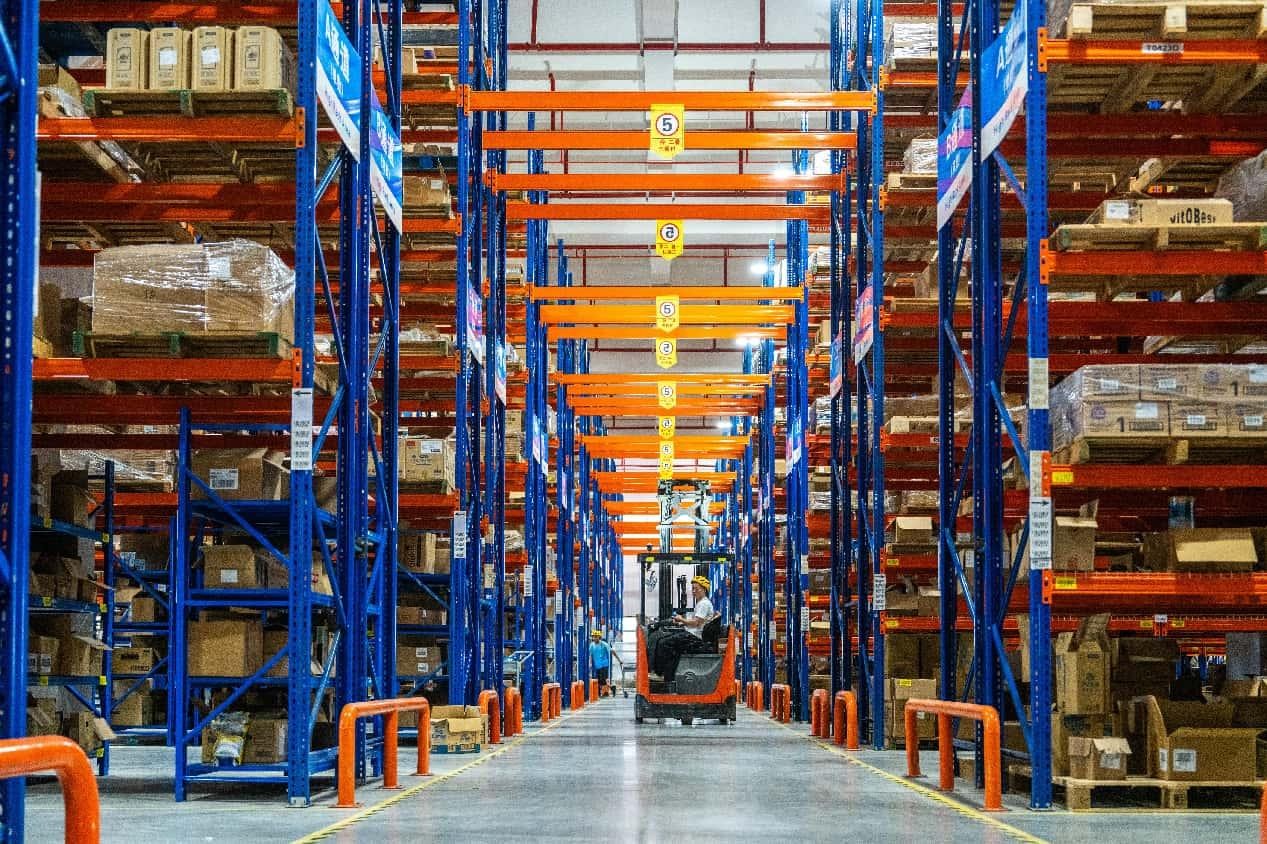Products from Southeast Asian dried fruits and African coffee to European black tea are flooding Chinese store - fresher and more affordable than ever - driven by cross-border e-commerce expansion.
As China's cross-border e-commerce sector grows, its global partnerships strengthen. China has established Silk Road E-commerce collaborations with 35 countries. Cross-border cooperation across e-commerce domains is gaining momentum, with global businesses increasingly viewing the Chinese market as essential for sectoral growth.

Imported commodities are handled in a bonded warehouse in Jinhua, east China's Zhejiang province. (People's Daily Online/Yang Meiqing)
What are the unique features and emerging trends of China's major e-commerce platforms? How can AI empower businesses going global? These were among the topics discussed at the recent Silk Road E-commerce Online Lectures for ASEAN. Real-time subtitles in Chinese, English, Vietnamese, and Thai scrolled across a large screen, while attendees listened attentively, jotting down notes.
Chinese companies and platforms are rapidly internationalizing. Cross-border leaders such as AliExpress, TikTok Shop, and Temu have gained global popularity, drawing a wave of "e-commerce fans" eager to replicate China's success models.
Husna, a student from Universiti Putra Malaysia, is one of many who came to China to study e-commerce. She recently joined a vocational training program on Chinese language and cross-border e-commerce at Guangxi Economic and Trade Vocational Institute in south China's Guangxi Zhuang autonomous region. The program offered courses on new media operations, business data analysis, and cross-border store management, while providing hands-on experience in running live-streaming sessions on platforms like TikTok. After a short period of study, Husna successfully began selling designer toys on TikTok.
As a key initiative under the Belt and Road framework, Silk Road E-commerce has become a new platform for bilateral and multilateral economic cooperation. Among its flagship programs, the Silk Road E-commerce Online Lectures series has hosted 108 sessions since its launch in 2020, benefiting more than 80 countries. Themed sessions tailored for Central and Eastern Europe, Latin America, Africa, and ASEAN have helped train a growing pool of e-commerce talent through both online and offline sessions.
For many traditional exporters, joining Chinese cross-border e-commerce platforms and embracing digital transformation is becoming a viable way to access global markets.
"Direct business with UK or Belgian customers seemed unimaginable before," said Eugene, an Uzbek entrepreneur. Initially skeptical of digital platforms, Eugene's company joined global business-to-business e-commerce platform Alibaba.com in April last year. The company's products were soon listed in English, Russian, and Arabic. In the very first month, Eugene received a $1,200 trial order from a UK buyer. A Belgian supermarket chain also placed a $9,000 order and quickly followed up with a second one double the size. "Now we're receiving orders every day from countries like the UK, Hungary, and Russia. Orders from Europe alone make up 65% of our business," Eugene said.
China's e-commerce sector, known for its innovation, diverse business models, and massive market size, is playing an increasingly active role in promoting global cooperation. So far, China has established Silk Road E-commerce partnerships with 35 countries, developed a range of cooperation brands, built 120 online and offline national pavilions, and set up 65 direct sourcing bases in 19 countries. Over 100 sessions of the Silk Road E-commerce Online Lectures series have been held to support skills development and knowledge sharing.

Photo shows the exhibition booth of TikTok Shop at the Yellow River Basin Cross-Border E-commerce Expo 2025. (People's Daily Online/Zhang Jingang)
This year, China's Ministry of Commerce has launched an e-commerce campaign, in which 18 provincial regions and 8 major e-commerce platforms rolled out 40 collaborative initiatives. Partner countries are invited to choose from a "menu" of projects tailored to their needs, enabling targeted and efficient cooperation.
This "menu-based" approach allows China to offer a catalog of potential collaboration projects, with partner countries selecting those best fit their development needs and implementing them accordingly.
The results have been significant. The Silk Road E-commerce Online Lectures for ASEAN held in Guangxi featured the first overseas in-person training and hands-on practice sessions, receiving praise from over a thousand ASEAN participants. The Quality African Products Online Shopping Festival has helped create more than 200 bestsellers. Qingdao, Guangxi, and Hunan province are also helping Silk Road E-commerce partner countries from Shanghai Cooperation Organization, ASEAN, and Africa to establish new online and offline national pavilions.
"The essence lies in using e-commerce as a tool focused on inclusivity and mutual benefit, and our aim is to serve global partners," said He Yongqian, spokesperson for the Ministry of Commerce. "Next, we will further expand imports of high-quality, specialty products and work together to build a shared global e-commerce marketplace."
(Source: People's Daily)
